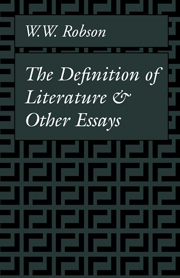Book contents
- Frontmatter
- Contents
- Preface
- Bibliographical note
- 1 The Definition of Literature
- 2 On Liberty of Interpreting
- 3 Evaluative Criticism, and Criticism without Evaluation
- 4 The Novel: a Critical Impasse?
- 5 The Sea Cook: a Study in the Art of Robert Louis Stevenson
- 6 On Kidnapped
- 7 On The Wind in the Willows
- 8 The Present Value of Tennyson
- 9 Robert Frost
- 10 Hopkins and Literary Criticism
- 11 T. S. Eliot: a Poet's Notebook
- 12 I. A. Richards
- 13 Yvor Winters: Counter-romantic
1 - The Definition of Literature
Published online by Cambridge University Press: 01 June 2011
- Frontmatter
- Contents
- Preface
- Bibliographical note
- 1 The Definition of Literature
- 2 On Liberty of Interpreting
- 3 Evaluative Criticism, and Criticism without Evaluation
- 4 The Novel: a Critical Impasse?
- 5 The Sea Cook: a Study in the Art of Robert Louis Stevenson
- 6 On Kidnapped
- 7 On The Wind in the Willows
- 8 The Present Value of Tennyson
- 9 Robert Frost
- 10 Hopkins and Literary Criticism
- 11 T. S. Eliot: a Poet's Notebook
- 12 I. A. Richards
- 13 Yvor Winters: Counter-romantic
Summary
Someone who asked for a definition of literature might want various things. He might want a concise formulation of what he already knew, such as might be found in a dictionary. Or he might want a witty aperçu, which looks at a familiar feature of our experience in an unexpected way. Or he might be a philosopher, asking for the necessary and sufficient conditions for the employment of this word; or a historian of ideas, interested in tracing the modulations of its meaning since Greco-Roman times. My object in raising the question is to isolate, as far as possible, the field of inquiry of literary criticism, to determine its subjectmatter and doctrine of relevance. I am interested, not so much in trying to find a particular formula which satisfies these requirements, but in asking what kind of definition is most likely to be useful.
For this purpose definitions of literature may be divided, without remainder, into the descriptive and the honorific; the honorific being those which refer to value or quality, and the descriptive those which do not. In an age when the natural sciences are in such high repute it is usual to look first for a descriptive definition since this, it is hoped, will reduce the constituent of subjectivity and confine itself as far as possible to properties which can be recognised, without rhetorical persuasion, by anyone.
- Type
- Chapter
- Information
- The Definition of Literature and Other Essays , pp. 1 - 19Publisher: Cambridge University PressPrint publication year: 1982



